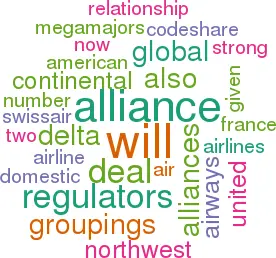Playing the alliance end-game
November 1998


The make–up of the handful of major alliance groupings that will dominate the industry in the first decade of the next century is now becoming clearer. But the construction of these groupings lies not solely in the hands of the airlines themselves, but will also depend on the decisions of the regulators, in particular the US Department of Justice and the US Department of Transportation.
The summer of 1998 saw what appeared to be the final stage of consolidation in the US airline industry, 21 years after deregulation, with a series of domestic code–share agreements and so–called virtual mergers proposed between American and US Airways, Northwest and Continental, and United and Delta.
The United/Delta deal appears to have self–destructed because of the demands of the unions at Delta. In any case, most analysts believe that the deal would not have received regulatory approval given that United ranks as the second largest passenger carrier by revenue in the US, and Delta the third. They were also in two separate, competing transatlantic alliances that both enjoy anti–trust immunity. There is more than a hint of suspicion that Delta and United were using a domestic code–share deal as a bargaining chip to block the other domestic alliances.
The other two transactions remain alive but subject to scrutiny by the regulators. The DoJ is particularly concerned by the clause in the Northwest/Continental agreement that will eventually allow Northwest to take a controlling stake in Continental.
The importance for the rest of the world is that by determining which transactions to approve the US regulators will, in effect, also determine the number of global strategic alliances. The US regulators have historically generally taken a very liberal stance towards airline consolidation, accepting the airline argument that airlines now compete through their networks rather than on an individual route–by–route basis. If, as seems likely, the US Airways and American deal is given the go ahead, along with a perhaps modified Northwest/Continental deal, then there will be four Mega–majors (see table below).
The final make–up of the US Mega–majors is pivotal in the shape of the global alliance groupings. No global alliance can be formed without a strong US partner and if the US regulators deem that the minimum number of Mega–majors it will permit is four then this will in turn determine the number of global alliance groupings.
Of these alliances, arguably the most advanced in terms of branding is the Star alliance, with United and Lufthansa as its core members. There is also a large amount of glue between oneworld partners British Airways and both American and latterly US Airways, which has now dropped its lawsuit against BA and is exploring ways to co–operate.
The confusion lies with the other two global groupings. KLM and Northwest have a strong partnership, which is probably the most advanced of the alliances in extracting revenue benefits. Alitalia is easily accommodated but Continental adds the complication that it also has a strong relationship with Air France. Whilst it would seem sensible for Continental’s management to wish to keep the relationship with Air France intact in case the Northwest deal fails to get regulatory approval, if it is given the go–ahead then surely Continental will join the so–called Wings grouping?
This will leave Delta and Air France, airlines that already have a code–share relationship, to extend this agreement into a full blown strategic alliance. A neat solution — but one that leaves Swissair uncomfortably positioned. At present Swissair is a member of the Atlantic Excellence grouping, which has not been marketed as aggressively as either Star or even the fledgling oneworld. Rumours persist that Swissair, and potentially its close partners, Austrian, Sabena and TAP, are considering other alliance options — in particular Wings and oneworld. The Swiss more than anyone else await the decisions of the US regulators with interest.
| 1997 revenue | |
| American + US Airways | $27.1bn |
| Northwest + Continental | $17.4bn |
| United | $17.4bn |
| Delta | $13.6bn |